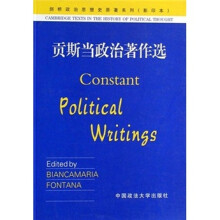贡斯当政治著作选(影印本)

目 录内容简介
Acknowledgements
Introduction
THE SPIRIT OF CONQUEST AND
USURPATION AND THEIR RELATION
TO EUROPEAN CIVILIZATION
Bibliographical note
Preface to the first edition
Preface to the third edition
Foreword to the fourth edition
Part I The spirit of conquest
The virtues compatible with war at given stages of social
development
The character of modem nations in relation to war
The spirit of conquest in the present condition of Europe
Of a military race acting on self-interest alone
A further reason for the deterioration of the military class
within the system of conquest
The influence of this military spirit upon the internal
condition of nations
A further drawback of the formation of this military spirit
The effect of a conquering government upon the mass of
the nation
Means of coercion necessary to supplement the efficacy
of falsehood
Further drawbacks of the system of warfare for enlightenment
and the educated class
The point of view from which a conquering nation today
would regard its own successes
Effect of these successes upon the conquered peoples
On uniformity
The inevitable end to the successes of a conquering nation
Results of the system of warfare in the present age
Part II Usurpation
The specific aim of the comparison between usurpation
and monarchy
Differences between usurpation and monarchy
One respect in which usurpation is more hateful than
absolute despotism
Usurpation cannot survive in this period of our civilization
Can usurpation not be maintained by force?
The kind of liberty offered to men at the end of the last
century
The modem imitators of the republics of antiquity.
The means employed to give to the modems the liberty of
the ancients
Does the aversion of the modems for this pretended liberty
imply that they love despotism?
A sophism in favour of arbitrary power exercised by one man
The effects of arbitrary power upon the different aspects of
human existence
The effects of arbitrary power upon intellectual progress
Religion under arbitrary power
Men's inability to resign themselves voluntarily to arbitrary
power in any form
Despotism as a means of preserving usurpation
The effect of illegal and despotic measures on regular
governments themselves
Implications of the preceding considerations in relation
to despotism
Causes which make despotism particularly impossible at this
age of our civilization
As usurpation cannot be maintained through despotism,
since in our days despotism itself cannot last, usurpation
has no chance of enduring
Additions to The spirit of conquest and usurpation
CHAPTERS ADDED TO THE FOURTH EDITION:
On innovation, reform and the uniformity and stability of
institutions
Further reflections on usurpation
On usurpation
Answer to an objection which could be drawn from
the example of William III
PRINCIPLES OF POLITICS APPLICABLE TO ALL
REPRESENTATIVE GOVERNMENTS
Bibliographical note
Foreword
On the sovereignty of the people
The nature of royal power in a constitutional monarchy
On the right to dissolve representative assemblies
On a hereditary assembly and on the importance of not
limiting the number of its members
On the election of representative assemblies
On the conditions of property
On discussion in the representative assemblies
On the right to initiate legislation
On the responsibility of ministers
On the declaration that ministers are unworthy of public
trust
On the responsibility of subordinates
On municipal power, local authorities and a new kind of
federalism
On the right to declare war and make peace
On the organization of armed forces in a constitutional state
On the inviolability of property
On the liberty of the press
On religious liberty
On the liberty of the individual
On judicial guarantees
Final considerations
THE LIBERTY OF THE ANCIENTS
COMPARED WITH THAT OF THE MODERNS
Bibliographical note
Bibliography
Index
Introduction
THE SPIRIT OF CONQUEST AND
USURPATION AND THEIR RELATION
TO EUROPEAN CIVILIZATION
Bibliographical note
Preface to the first edition
Preface to the third edition
Foreword to the fourth edition
Part I The spirit of conquest
The virtues compatible with war at given stages of social
development
The character of modem nations in relation to war
The spirit of conquest in the present condition of Europe
Of a military race acting on self-interest alone
A further reason for the deterioration of the military class
within the system of conquest
The influence of this military spirit upon the internal
condition of nations
A further drawback of the formation of this military spirit
The effect of a conquering government upon the mass of
the nation
Means of coercion necessary to supplement the efficacy
of falsehood
Further drawbacks of the system of warfare for enlightenment
and the educated class
The point of view from which a conquering nation today
would regard its own successes
Effect of these successes upon the conquered peoples
On uniformity
The inevitable end to the successes of a conquering nation
Results of the system of warfare in the present age
Part II Usurpation
The specific aim of the comparison between usurpation
and monarchy
Differences between usurpation and monarchy
One respect in which usurpation is more hateful than
absolute despotism
Usurpation cannot survive in this period of our civilization
Can usurpation not be maintained by force?
The kind of liberty offered to men at the end of the last
century
The modem imitators of the republics of antiquity.
The means employed to give to the modems the liberty of
the ancients
Does the aversion of the modems for this pretended liberty
imply that they love despotism?
A sophism in favour of arbitrary power exercised by one man
The effects of arbitrary power upon the different aspects of
human existence
The effects of arbitrary power upon intellectual progress
Religion under arbitrary power
Men's inability to resign themselves voluntarily to arbitrary
power in any form
Despotism as a means of preserving usurpation
The effect of illegal and despotic measures on regular
governments themselves
Implications of the preceding considerations in relation
to despotism
Causes which make despotism particularly impossible at this
age of our civilization
As usurpation cannot be maintained through despotism,
since in our days despotism itself cannot last, usurpation
has no chance of enduring
Additions to The spirit of conquest and usurpation
CHAPTERS ADDED TO THE FOURTH EDITION:
On innovation, reform and the uniformity and stability of
institutions
Further reflections on usurpation
On usurpation
Answer to an objection which could be drawn from
the example of William III
PRINCIPLES OF POLITICS APPLICABLE TO ALL
REPRESENTATIVE GOVERNMENTS
Bibliographical note
Foreword
On the sovereignty of the people
The nature of royal power in a constitutional monarchy
On the right to dissolve representative assemblies
On a hereditary assembly and on the importance of not
limiting the number of its members
On the election of representative assemblies
On the conditions of property
On discussion in the representative assemblies
On the right to initiate legislation
On the responsibility of ministers
On the declaration that ministers are unworthy of public
trust
On the responsibility of subordinates
On municipal power, local authorities and a new kind of
federalism
On the right to declare war and make peace
On the organization of armed forces in a constitutional state
On the inviolability of property
On the liberty of the press
On religious liberty
On the liberty of the individual
On judicial guarantees
Final considerations
THE LIBERTY OF THE ANCIENTS
COMPARED WITH THAT OF THE MODERNS
Bibliographical note
Bibliography
Index
目 录内容简介
在政治理论领域,“剑桥政治思想史原著系列”作为主要的学生教科丛书,如今已牢固确立了其地位。本丛书旨在使学生能够获得从古希腊到20世纪初期西方政治思想史方面所有最为重要的原著。它囊括了所有著名的经典原著,但与此同时,它又扩展了传统的评价尺度,以便能够纳入范围广泛、不那么出名的作品。而在此之前,这些作品中有许多从未有过现代英文版本可资利用。只要可能,所选原著都会以完整而不删节的形式出版,其中的译作则是专门为本丛书的目的而安排。每一本书都有一个评论性的导言,加上历史年表、生平梗概、进一步阅读指南,以及必要的词汇表和原文注解。
本丛书的最终目的是,为西方政治思想的整个发展脉络提供一个清晰的轮廓。
本丛书的最终目的是,为西方政治思想的整个发展脉络提供一个清晰的轮廓。
比价列表价格走势







 缺书网
缺书网 扫码进群
扫码进群